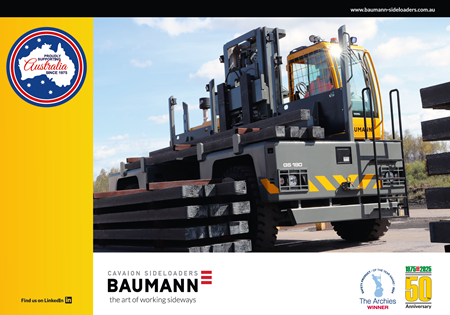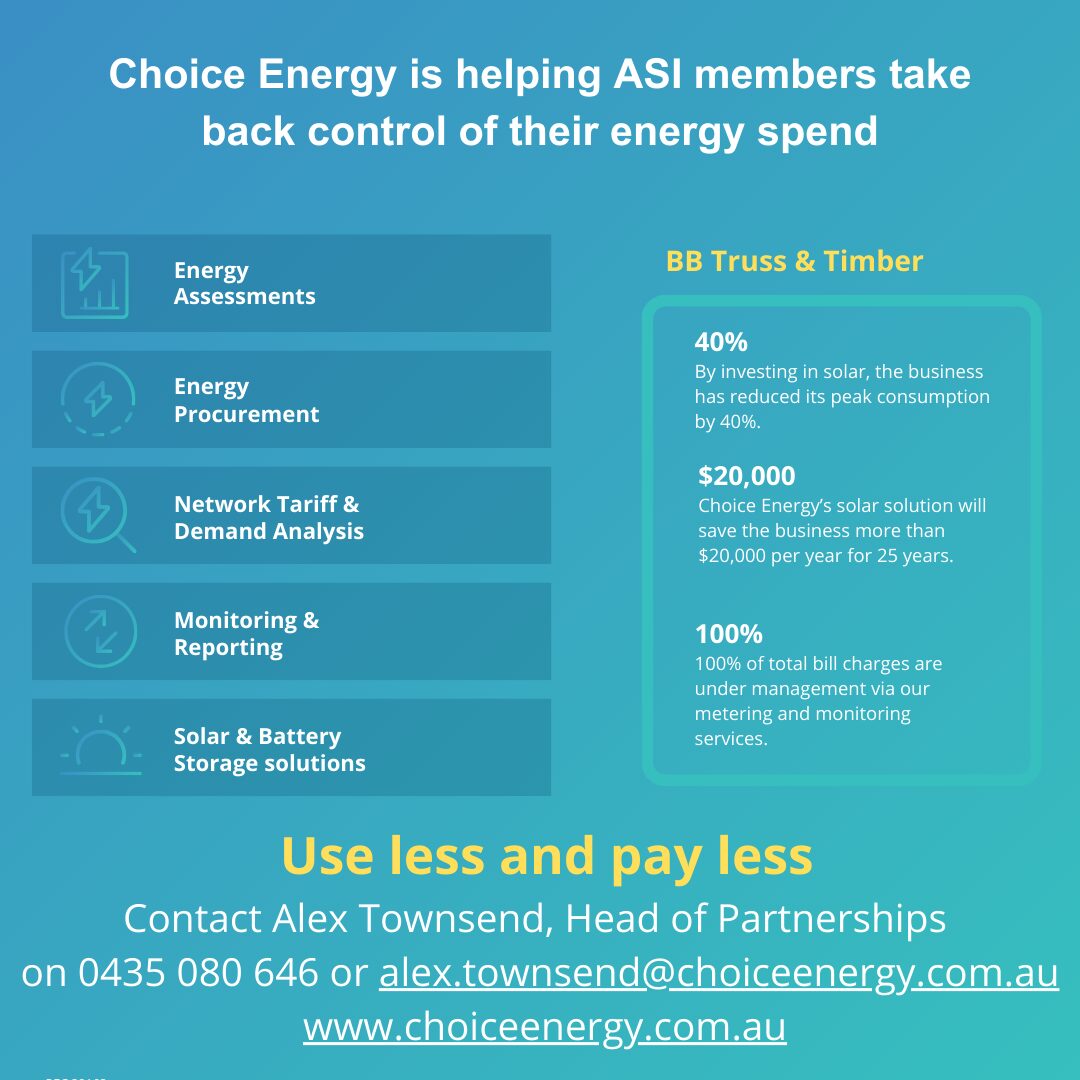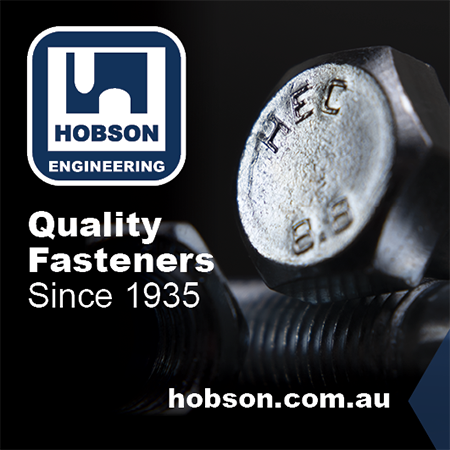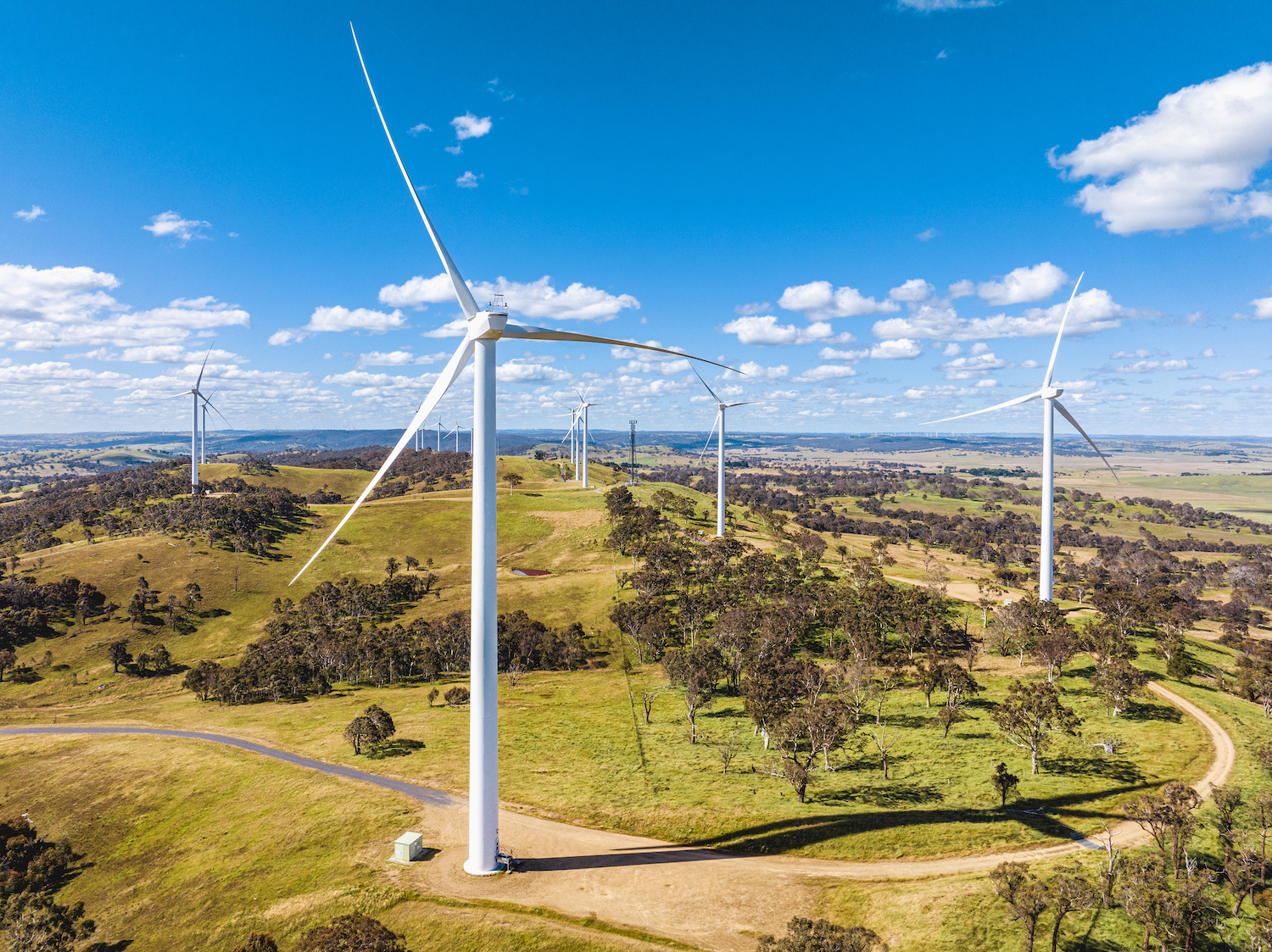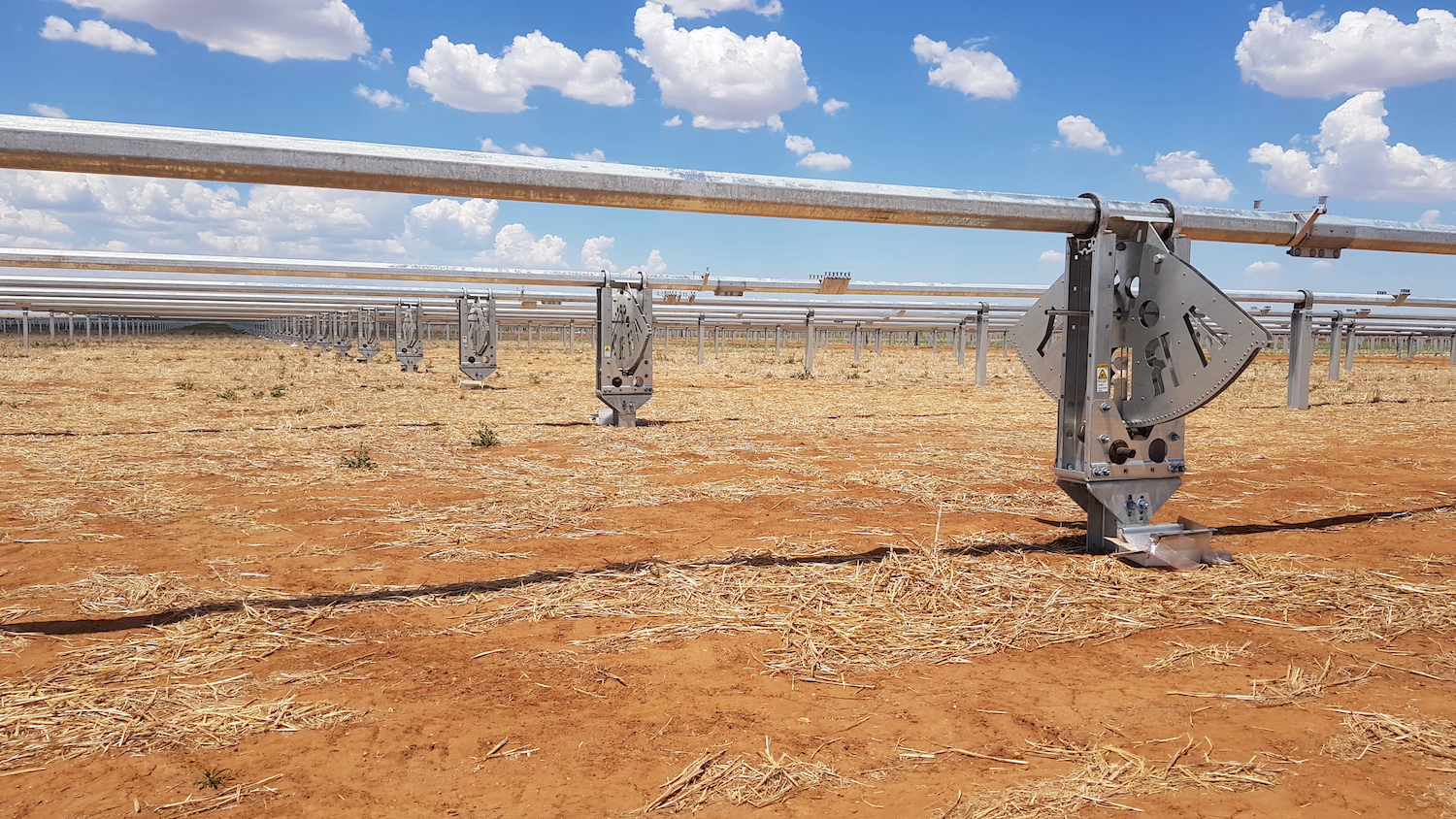Diversity and inclusion are crucial factors for attracting and retaining a skilled workforce. Organisations that embrace diversity and promote inclusion create a positive work culture that attracts and retains top talent. The benefits of having a diverse workforce go beyond just a better work environment; it can also lead to increased innovation, better decision-making, and improved financial performance.
A focus on diversity and inclusion enables organisations to tap into a wider pool of talent. In Australia, the workforce is becoming increasingly diverse, with workers from different ethnic backgrounds, genders, and age groups. According to the latest data from the Australian Bureau of Statistics, 30 per cent of the Australian population was born overseas, and 49 per cent of the population had at least one parent born overseas1. By having a diverse workforce that represents the broader community, organisations can access a wider range of skills, ideas, and perspectives, which can lead to improved business outcomes.
Furthermore, promoting diversity and inclusion in the workplace can also lead to higher employee satisfaction and retention rates. According to a recent report by Deloitte, employees who feel included in their workplace are three times more likely to feel engaged and empowered to do their best work. In addition, when employees feel that their company values and respects their differences, they are more likely to remain with that company long-term.
Diverse, inclusive workforces can lead to better decision-making. According to a study by McKinsey & Company, companies with diverse executive teams are 33 per cent more likely to have better financial performance than companies without diverse teams2. Companies with inclusive cultures are:
- twice as likely to meet or exceed financial targets
- three times as likely to be high-performing
- six times more likely to be innovative and agile
- eight times more likely to achieve better business outcomes3
Diverse teams bring a variety of perspectives and experiences to the decision-making process, leading to more well-rounded and informed decisions. Given all these benefits, it is little wonder that many of ASI’s members are firmly focused on fostering a diverse, inclusive workplace culture.
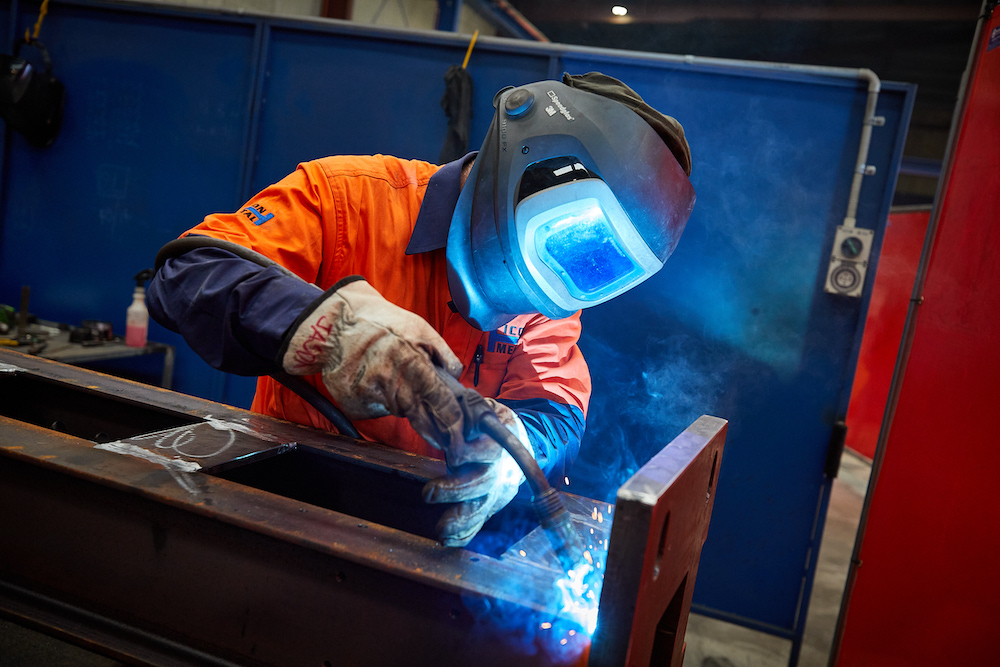
Icon Metal
Based in Western Sydney, Icon Metal specialises in architectural and structural steel fabrication and installation. The company offers a full range of construction services, from design and project management, to fabrication and installation. Their mission is to enhance the built environment, while nurturing their extraordinary people and delivering a quality product to their clients.
According to Icon Metal’s chief executive officer, Stephen Pribula, “From the beginning, Icon Metal had a diverse, inclusive workforce. We were established in 1996, and started out with five employees. As the company grew, so did our workforce. By the time we had a team of 20 people, our workforce comprised six to eight different nationalities. Today, we have a team of over 60 people, which includes 20 different nationalities.”
“We knew our diversity was an asset. So, we made the decision to grow and expand upon this. First, we formalised our inclusive workforce culture through policies and procedures—we wanted to officially document our approach.”
A considerable amount of research and planning went into the development of these policies and procedures. The Icon Metal team reviewed applicable legislation, including the Human Rights Act 1998 and the Anti-Discrimination Act 1977, as well as a raft of other material.
“We settled on policies and procedures that made sense for our business. We knew these documents needed to be something we could live by—not just a box ticking exercise. You have to commit to, manage, monitor and review these documents. So they cannot be too cumbersome,” Pribula said.
“All our policies and procedures are focused on informing employees of their rights, rather than telling them about their obligations. We include them in our induction packs and educate all our staff on our values: no one at Icon Metal is discriminated against based on their on age, marital status, race, religion, family responsibilities, pregnancy, political opinions or anything else. Our entire team understands what we believe as a leadership team and as a company.”
Icon Metal’s management team also ensures that all staff understand, and have access to, a clear conflict resolution process if grievances do arise.
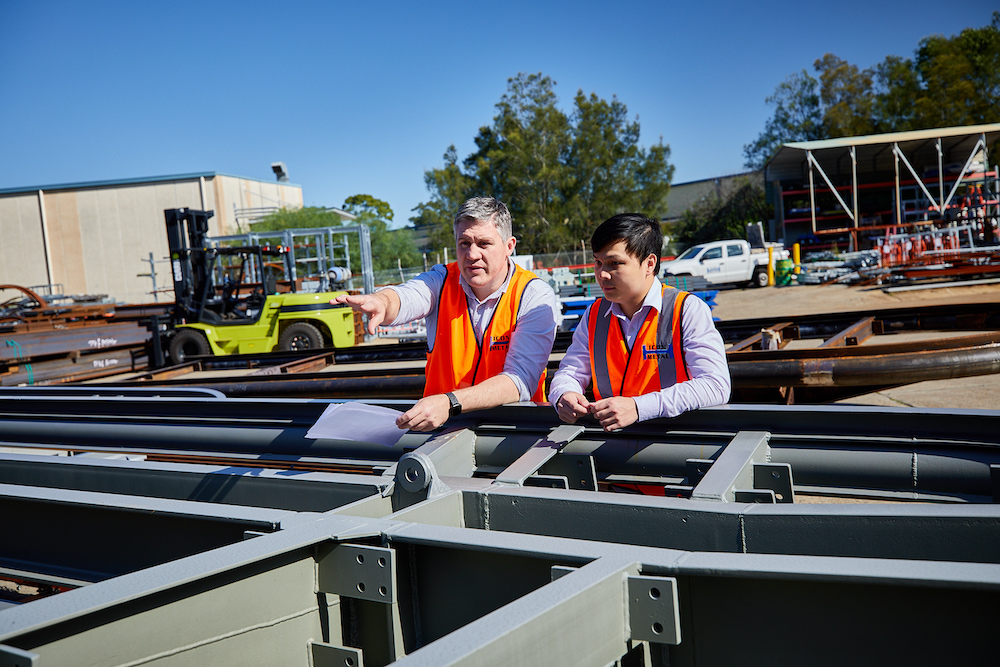
Gender diversity
One area in which Icon Metal is always looking to improve is gender diversity.
“As a major sub-contractor in Sydney, we see every day that women are more likely to work for tier one contractors, rather than sub-contractors like Icon Metal. It is still a challenge to get women into workshops and trades. That got us wondering why this is, and how can we make it a more attractive option.”
In fact, just 12 per cent of Australia’s construction workforce is women, meaning the industry is missing out on employing half the working population—and this is at a time when a massive 105,000 additional construction workers are needed to deliver Australia’s project pipeline.
“Our workforce currently has a female participation rate of 20 per cent. We are working to increase this to
25 per cent. Like most organisations in the construction and manufacturing sectors, our female staff are employed predominantly in areas like human resources, compliance and business development. We have one female on-site, but none on the factory floor. To help combat this, we have focused on making our workplace as flexible as possible.”
“When we established our leadership group, we made sure that three out of the six roles were women. These women bring a different perspective—a perspective that I not only want, but need in my business,” Pribula said.
Icon Metal is a Silver member of the National Association of Women in Construction (NAWIC), and encourage their female staff to take advantage of the benefits this can offer, from seminars and site visits to mentoring.
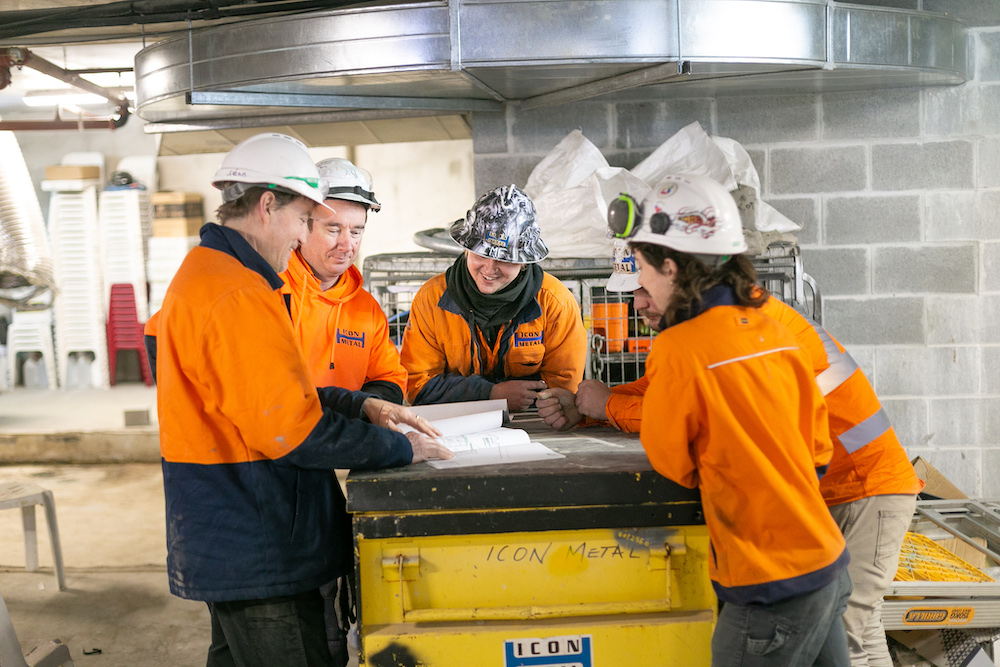
A focus on First Nations
In May 2021, Icon Metal had their first Reflect Reconciliation Action Plan endorsed by Reconciliation Australia. This was a long-held ambition for the company.
“We’re placing a greater emphasis on Indigenous participation. We work with a couple of different employment agencies to attract First Nations people in the business, and currently employ two First Nations people,” Pribula said.
This integrates with Icon’s strong stance on mental health programs. Icon Metal is a stigma-free company, where it is OK to not be OK, and where the culture of silence that surrounds mental ill health is challenged. Through their partnership with workplace consultants Mental Health Movement, Icon Metal’s staff have access to training, workshops and support.
For Icon Metal, their focus on an inclusive workforce has delivered only positive outcomes. “Our team really understands our focus on a diverse, inclusive culture. They see how this works in practice, and it gives them another purpose. It also helps ensure that they are committed to the business as a whole, for the long-term. Our focus on diversity and inclusion has definitely helped us to attract and retain the right sort of people,” Pribula said.
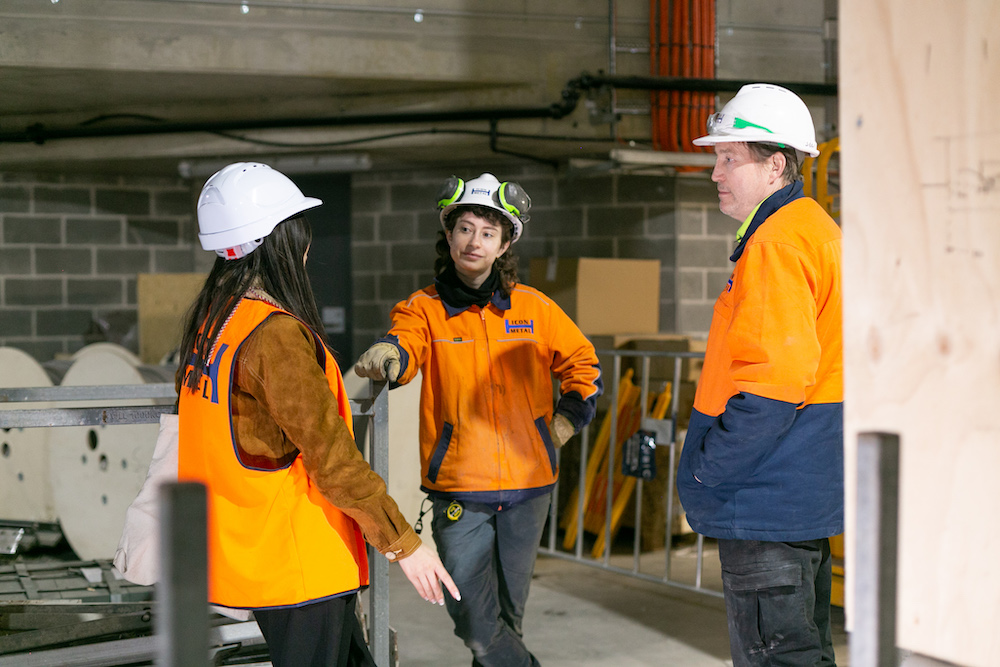
Protective Fencing Australia
A family-owned manufacturing business, Protecting Fencing is Australia’s trusted fencing partner. The company has been proudly manufacturing in Australia since 1973, using the highest quality locally-sourced raw materials and the best machinery available.
Samantha Swain, the director of Protective Fencing and a trailblazing female leader in the construction and manufacturing industries, firmly believes that diversity and inclusion are crucial for success in any business. Drawing on her own experiences of feeling like a minority in the industry, she advocates for greater respect and appreciation of people from different ethnicities, genders, religions, and abilities. Her vision is to create a workplace culture that values and embraces diversity, where everyone feels included and empowered to contribute their unique perspectives and talents.
“We need to move towards the idea that no one person is at a disadvantage. People might have unique strengths and challenges, but increased abilities elsewhere. As industry leaders, we need to collaborate with individuals, and their abilities, to transfer their skills into the areas where they can be most valuable,” Swain said.
Protective Fencing is committed to creating a workplace culture that champions diversity and inclusion. While recognising that larger tier one contractors have been successful in this area, Protective Fencing is determined to be just as progressive in its approach, despite being an SME. The company has developed a holistic strategy that is entirely focused on promoting diversity and inclusion, with the aim of fostering an environment where every team member feels valued, respected, and empowered to contribute their unique perspectives and talents.
“The first step we took was a review of our mission, values and behaviours. Our goal was to ensure that these elements reflected our inclusive work culture. With this in mind, as a team, we identified six core values for success. These are: tenacity, quality, integrity, sustainability, respect and accountability,” Swain said.
“We then elaborated on each of these values and defined them with corresponding behaviours to give them more clarity and meaning in our context. Integrity, respect and accountability all directly relate to owning the way you behave and respecting other people’s diverse backgrounds.”
“These six values and their corresponding behaviours are promoted and reinforced to our team in everything we do—not just in yearly performance reviews, regular toolbox meetings, or in posters around the workshop, but in our everyday conversations within the business,” Swain said. “Our company’s values and corresponding behaviours not only empower our staff to drive our success, but also help us retain top talent. In addition, they serve as a clear indicator of whether someone is a good fit for our team in terms of our values and culture.”
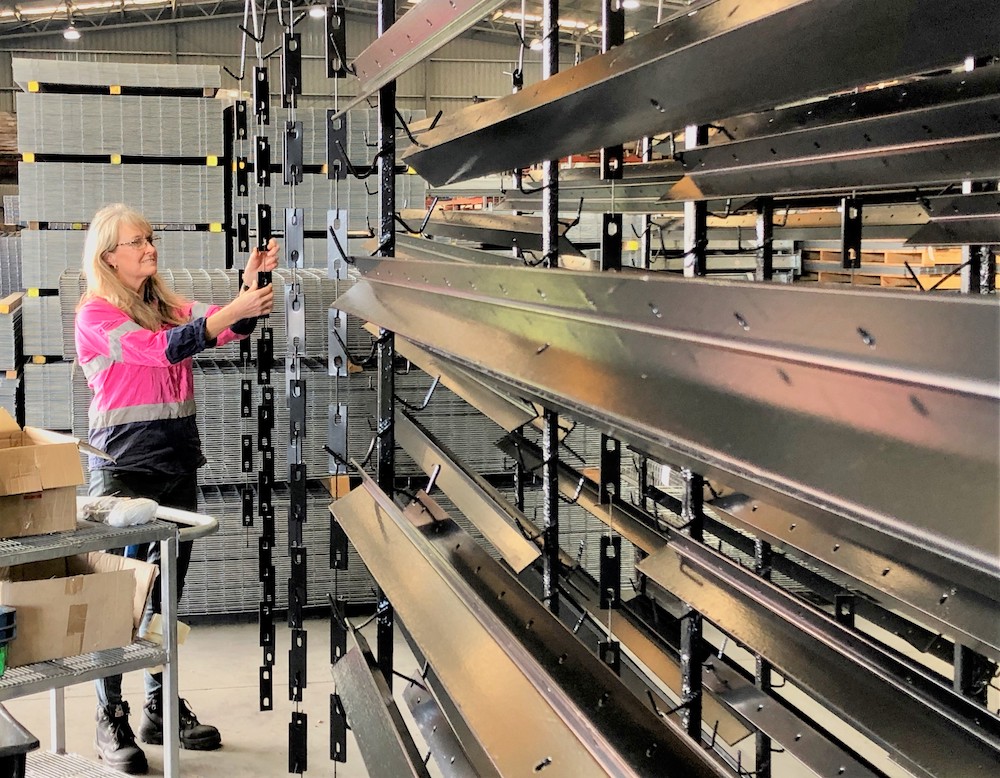
Practical implementation
Protective Fencing’s successful implementation of its new mission, values, and behaviors is exemplified by a recent recruitment effort for a machine operator.
As Swain explained, “Initially, a ‘traditional’ job advertisement yielded a few male applicants, but none of them met the job requirements. However, when the company shifted its focus to promoting its inclusive and diverse work culture, along with benefits like proximity to home and teamwork, the response was remarkable. The second job advertisement attracted 20 applicants, of which over a quarter were female. After careful consideration, Protective Fencing hired a man and a woman who continue to work for the company today.”
“When you start promoting a diverse work culture, you improve the reach of your talent pool.”
“Recruitment, retention and onboarding strategies need to change. The focus must be on the reason why people would want to work with you—what makes your company a great place to work. The employment landscape has evolved, so companies must evolve with it. Job seekers have more options now than ever before. Society has moved away from the idea that it is the company interviewing a candidate—interviews are a two-way street. People want to work somewhere where they can wake up in the morning feeling motivated and enthusiastic about their day,” Swain said.
Another important factor is offering workplace flexibility. For instance, it is important to have policies in place for parental leave. “Any parent—regardless of gender—should be equally able to care for their child. Having a management team that respects the shared responsibility of parents is important. Managers should not be asking fathers why they are taking time off to care for a child. Having a policy in place that recognises shared parenting arrangements is essential.”
“Historically, this hasn’t been my experience. My husband and I both work full-time, have challenging jobs and share parenting equally. Fathers are just as entitled to parental care as mothers; parental responsibilities should be able to be shared equally.”
“We are proud of what we have achieved so far, but we are even more excited about what the future holds for Protective Fencing as we continue to build a diverse and inclusive team that is focused on delivering the highest quality products and services for our customers.”
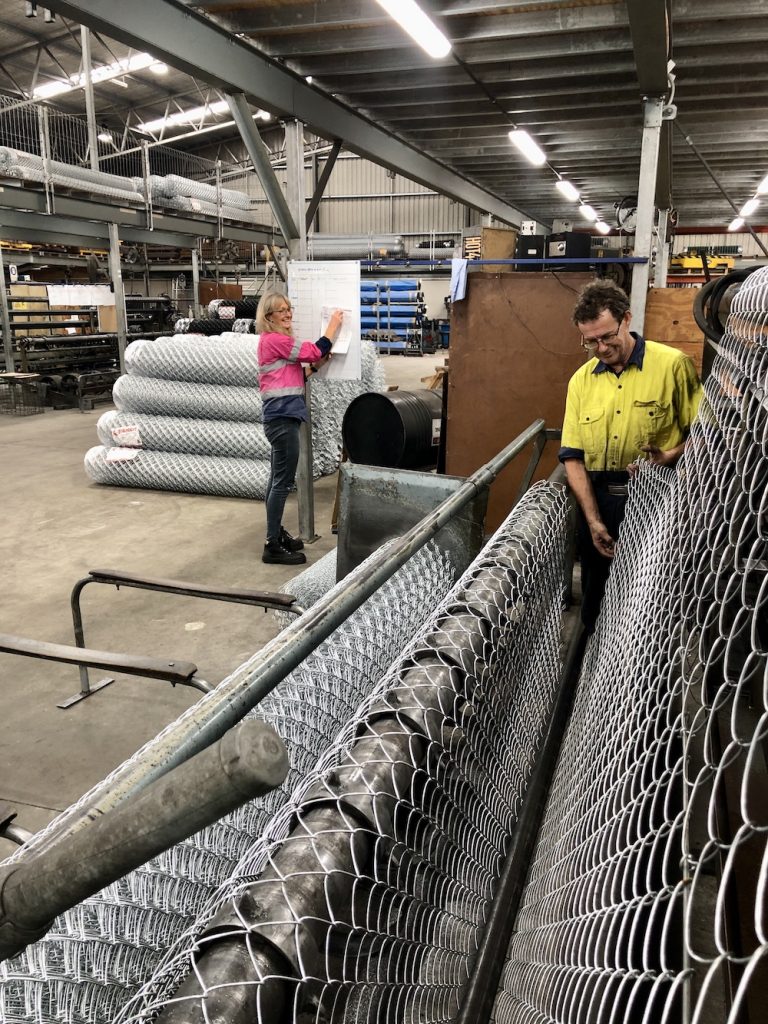
Structural Challenge
Based in Melbourne, Structural Challenge is a client-focused, service-oriented structural steel fabricator. With services extending right through to design, detailing and erection, Structural Challenge works across the commercial, health, education and infrastructure sectors.
According to their managing director, Maria Mavrikos, diversity and inclusiveness have always been an important company value for Structural Challenge.
“As a female who started in the industry 30 years ago—when there were no females working in fabrication—diversity has always been a priority for me. I am Greek-Cypriot and was a refugee when I first arrived in Australia. So I am passionate about helping people from disadvantaged backgrounds start their career in steel.”
“As Structural Challenge has grown
as a business, we have more resources to be able to put the right programs, policies and procedures in place, and actively promote diversity. All our policies are focused on ensuring equitable treatment, regardless of gender, nationality or ability,”
Mavrikos said.
“We have about 17 different nationalities that work here, so we do a lot in terms of celebrating multi-cultural initiatives.”
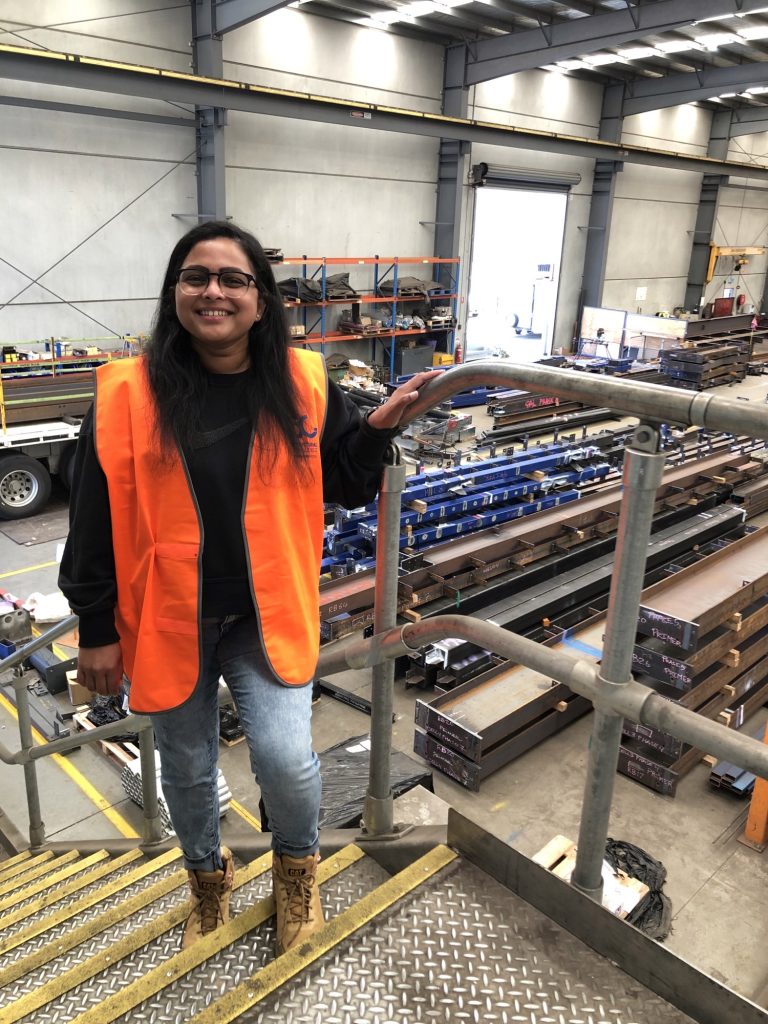
Female workforce participation
Structural Challenge is also focused on increasing its female site engineers and tradespeople in the factory.
“Increasing gender diversity in our workforce has been quite a conscious action that we’ve taken over the last two years. For the first time in my 30 years in the industry, we have two female boilermakers, one female welder and one female labourer.”
Structural Challenge has implemented several key programs that have helped facilitate greater workforce diversity.
“We partner with Swinburne University and a couple of local schools, and host open days for the students. We encourage female students to come along, and create a comfortable environment for them. We emphasise that Structural Challenge is a female run business with a number of female employees,” Mavrikos said.
“We have our female employees talk to the female students about the career paths and opportunities that are available. We emphasise that students have a whole range of options open to them: there is engineering, project management, detailing, site coordination, and more. Through these open days, we have had a number of girls do internships with us, and then go on to graduate programs.”
“We take in three cohorts of interns every year for a 12 week program and ensure that there are always females in each cohort.”
“As an industry, we need to work more closely with high schools to promote opportunities in steel to kids at a young age—we can’t wait for students to finish university. We need to plant the seed when they’re in years nine and ten, undertaking work experience,” Mavrikos said.
As a result of their programs, Structural Challenge boasts a female senior project manager, which is rare in the industry. Their senior project coordinator is also female.
“I’ve just started up a networking group called Steel Chicks, which enables females in the industry to get together, talk, mingle and support each other. I am also involved in other groups like Empowering Women in Trades. Everyone in the steel industry should support these types of groups, to encourage more women into the industry,” Mavrikos said.
Sources
1 https://www.abs.gov.au/media-centre/media-releases/30-australias-population-born-overseas
2 https://www.mckinsey.com/capabilities/people-and-organizational-performance/our-insights/delivering-through-diversity
3 https://www2.deloitte.com/us/en/insights/deloitte-review/issue-22/diversity-and-inclusion-at-work-eight-powerful-truths.html




